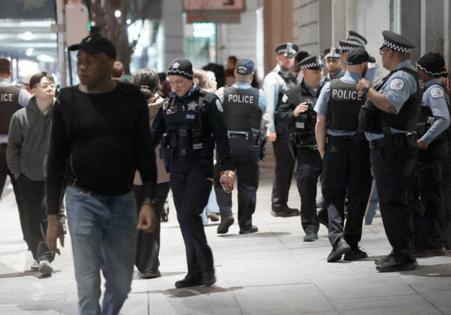As Chicago teen curfew faces final vote, police superintendent backs away from 'politics' of debate
Published in News & Features
CHICAGO — One person has loomed large over the controversial City Council ordinance giving police power to declare stricter teen curfews anywhere in Chicago: Chicago police Superintendent Larry Snelling.
The measure teed up for a final vote Wednesday would give Snelling and future superintendents final say to declare the curfews. And as the long-awaited vote arrives, aldermen on opposing sides are claiming Snelling supports them.
Sponsor Ald. Brian Hopkins said Tuesday afternoon Snelling is calling aldermen to urge them to pass the ordinance. But Ald. Jason Ervin said Snelling told the aldermanic Black Caucus he did not need the curfew power during a Tuesday night briefing.
Snelling did not take a clear side Wednesday morning when pressed by the Tribune. The superintendent said police will “do everything in our power to prevent violence,” regardless of the outcome.
“To be clear, we have always enforced the law at large gatherings and will continue to do so at all future large gatherings. Those who commit crimes or acts of violence will be arrested and held accountable,” Snelling said.
He did not say whether he would use the new curfew powers if the ordinance passes.
“The curfew ordinance has become more a matter of politics than public safety. Given that this is a matter that sits within the City Council, I have no further comment,” he added.
Hopkins, 2nd, first proposed the ordinance last year after a downtown youth gathering ended in violence and began to push it forward again in March after two similar gatherings culminated in high-profile shootings.
It has since taken a winding path through the council, defined by heated disagreement and major changes. Hopkins first planned to target only downtown with an 8 p.m. curfew, two hours earlier than the long-standing citywide teen curfew. Hopkins then sought to give both Mayor Brandon Johnson’s deputy mayor for community safety and the police superintendent shared power to declare the pop-up curfews together.
All the while, progressive aldermen and civil rights groups blasted the curfew push as unconstitutional, while Johnson shared measured criticism that signaled personal disapproval, but did not offer clear voting direction for aldermen.
After delaying tactics by opponents, Hopkins pushed forth a version giving Snelling the exclusive power to declare pop-up curfews after consulting others.
Johnson harshly criticized that proposal Tuesday, a signal he may veto the ordinance if it passes.
“I don’t think this is necessary at all, I just don’t,” Johnson said during a news conference.
The mayor touted the city’s steep drops in violent crime this year and said he, an Austin resident, is the only mayor in Chicago’s history who has lived in one of the city’s most violent neighborhoods.
“I know what it’s like to feel unsafe and to be targeted. We have to stop as a city falling to some of the most ridiculous, remedial forms of governance. It has not worked,” he said, pounding the table. “And now we’re doing stuff that works, and then they want to come up with another idea that has not worked. What sense does that make?”
While Hopkins said he has support from a majority of aldermen, Johnson has not clearly said if he plans to veto the ordinance. The last mayoral veto occurred in 2006, when Mayor Richard M. Daley vetoed an ordinance that would have required “big-box” retailers like Walmart to pay wages of $10 an hour.
Snelling offered a mixed response to the ordinance in court testimony last week. He said he would not use a “snap curfew” power to declare curfews shortly before they go into effect, but would use a power allowing him to declare curfews days in advance when police are forewarned of such gatherings.
The ordinance “would be used as a deterrent where, if we have that information days before, we would send out notifications to CPS, to parents,” he said. “This is going to prevent the possibility of violence.”
He added that he would never agree to a measure targeting only downtown and that curfew violations are not criminal, meaning they would not result in arrests.
Hopkins has for months cited support from Snelling to promote the ordinance. He maintained Tuesday afternoon that the superintendent “remains in full support of the ordinance, as is” and said Snelling has called aldermen about the vote.
“They are having conversations with him, and every one of those conversations ends with the superintendent saying, ‘I support this ordinance. I urge you to pass it,’” Hopkins said.
Ervin, 28th, said Snelling told Black Caucus aldermen Tuesday night that he does not need the powers the ordinance grants. Ervin added that he hopes Johnson will veto the measure if it passes.
“To me it is not good policy. It is too much power,” Ervin said.
A coalition of groups opposed to the ordinance rallied outside City Hall before the vote Wednesday. They called for the city to instead invest in youth jobs, violence prevention programs and safe, engaging activities for young people who do not have enough to do in the city’s South and West Sides.
The curfew ordinance could lead to teens being kicked out of parks and beaches with just a 30-minute notice, GoodKids MadCity organizer Reynia Jackson said.
“It isn’t fair and it isn’t equitable,” Jackson said. “What we need is healing. What we need is prevention.”
---------
—Chicago Tribune reporter Sam Charles contributed.
____
©2025 Chicago Tribune. Visit at chicagotribune.com. Distributed by Tribune Content Agency, LLC.







Comments